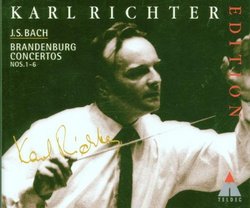| All Artists: J.S. Bach, Richter Title: Brandenburg Concerti 1-6 Members Wishing: 1 Total Copies: 0 Label: Elektra / Wea Release Date: 2/13/1996 Genre: Classical Styles: Forms & Genres, Concertos, Historical Periods, Baroque (c.1600-1750) Number of Discs: 2 SwapaCD Credits: 2 UPC: 745099790325 |
Search - J.S. Bach, Richter :: Brandenburg Concerti 1-6
 | J.S. Bach, Richter Brandenburg Concerti 1-6 Genre: Classical
|
Larger Image |
CD DetailsSimilar CDs |
CD ReviewsA committed recording Joe Moreno | Oakland, CA USA | 06/10/2000 (4 out of 5 stars) "The beauty of this music is the diversity within the six concerti, whether it be the dance-like Finale of the 3rd concerto, the two violas intimately conversing in the 6th, or the recorders singing adoringly over harpsichord and string accompaniment, the Brandenburg Concerti live eternal. This set in particular by Richter is very well done and we have come to expect no less from the noted Bach scholar whose passionate, vital and profoundly committed performances are absolute treasures.I'm by no means a huge admirer of the Baroque period, but these readings are enough to make a convert of me. There's such buoyancy and conviction throughout, it would be impossible for the coldest of hearts not to be touched. My favorite of the six concerti is the third in G major, which Richter makes absolutely transparent in a fantastic display of warm, exuberant music-making. The aura of Karl Richter, experienced by so many who witnessed his performances, is not something easily comprehended these days. But when I listen to these performances, and I find myself falling in love with Bach all over again, it is clear Richter was in a league by himself.You won't get the sort of cold precision other conductors pride themselves on. Instead you're presented with the warm, gentle touch of a life-long lover of Bach. And that alone is worth the price of admission." A matter of taste and history paul pirate | New York, New York | 04/10/2002 (5 out of 5 stars) "Sometimes the recording you grow up with sets the tone for your preferences when listening to a piece from then on. Such was the case for me with the Richter, which came out in the era (1960s) when conductors were reducing orchestral size to play Baroque music, but hadn't gotten much past using recorders and harpsichords as a matter of course. The Harnoncourt-Leonhardt-Brueggen revolution came soon enough, however, with views about tempo and phrasing that rejected the neo-Romantic approach that been the norm, and buried recordings like the Richter in the musical closet of political correctness.I remember that, during my record store clerk days, a most knowledgeable customer denounced me and my taste by announcing in no uncertain terms that the Richter was "so slow." Maybe that was the real watchword of the neo-Baroque approach: all those genuinely beautiful "old" sounds meshing with what could be an appalling lack of musicality in so many cases. (I would cite Brueggen as a quirky but gifted exception to this.) There had and has to be a "truth" somewhere in between the extremes of heavy, burdensome Bach and lightweight, perfunctory Bach.And so, as I return to find (somewhat unexpectedly) a CD available of my old friend the Richter Brandenburgs, skilfully praised by the other reviewers, I can look back with pleasure at the fact that, despite its oldfashionedness (Richter was an organist, after all) and the slightly dated recording technology, these performances wear their years well, and can still make me smile warmly at so many places in this well-trodden but still marvelous road."
|

 Track Listings (10) - Disc #1
Track Listings (10) - Disc #1

